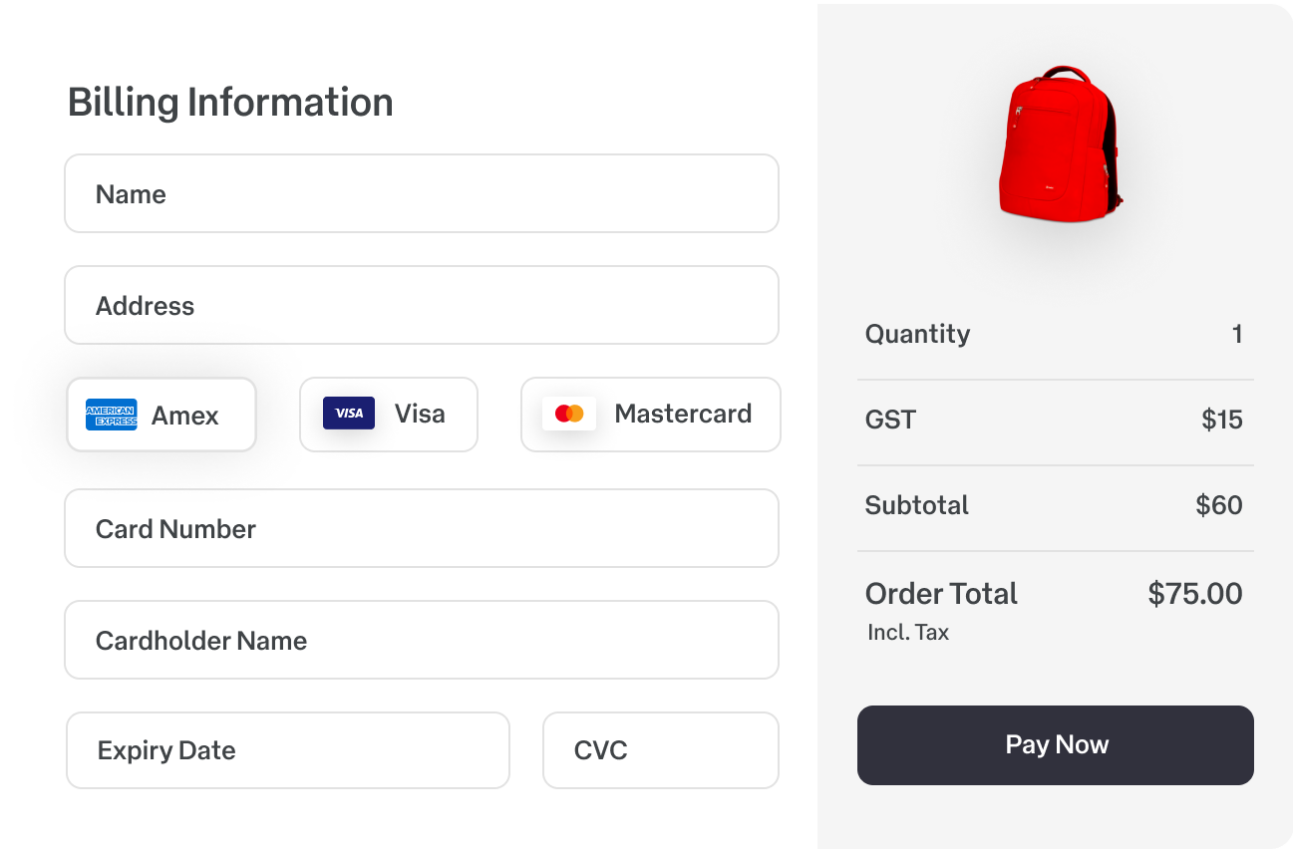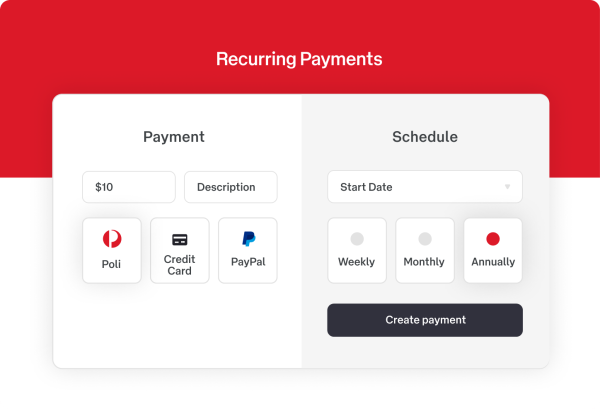Payments
Learn how to accept online payments with a payment gateway!
Start implementing online payments on your website or ecommerce platform. SecurePay offers secure payment services that match your business needs. Discover a flexible and secure online payment gateway solution with SecurePay 1.

SecurePay payment gateway pricing
No regular, setup or hidden fees - SecurePay uses a straightforward per-transaction pricing model for its online payment gateway services.
Standard
1.6% +
$0.30 AUD
Domestic cards
3.4% +
$0.30 AUD
International cards
No monthly fees
No annual fees
No setup fees
No additional fees for Amex, Diners or Apple Pay
Standard $25 chargeback fee
Custom
Generating more than $1 million in annual revenue?
Working in the Government, Education or Charity sectors?
You may be eligible for:
Tailored pricing
Dedicated support
Account management

Simple automated subscription payments
Offer your customers greater flexibility and peace of mind through automatic payments. Once subscribed, your audience can opt for recurring card payments or direct debit payments to seamlessly pay for your offering and enjoy it on a regular basis. Ready, set and forget!

All-in-one merchant and payment gateway solution
SecurePay’s internet payment gateway can also be used as a direct debit gateway or recurring payment gateway.
Ready to implement SecurePay’s merchant account and payment gateway?
What is a leading Australian payment gateway?
SecurePay is a trustworthy payment service provider and is one of the leading payment gateways in Australia. With a strong emphasis on security and PCI DSS (Payment Card Industry Data Security Standard) compliance, it is appealing to both businesses and customers. Having a focus on the Australian market and deep understanding of local needs make it a preferred choice for ecommerce businesses.
SecurePay offers a diverse range of payment methods, including credit and debit cards, along with support for popular digital wallets like Apple Pay, catering to the varied payment preferences of customers. The payment gateway also offers easy integration with all website types and ecommerce extensions.
Benefit from advanced features such as recurring billing, fraud prevention tools, simple reporting, straightforward pricing, Dynamic Currency Conversion and flexible user-friendly interfaces. Being a leading payment gateway in Australia, SecurePay serves businesses of all sizes across diverse industries.
What is the most popular payment method in Australia?
Payment methods are always innovating and new payment services are developed throughout time. However, credit and debit card payments are among the most popular payment methods in Australia. Cards issued by major brands like Visa, Mastercard and American Express are widely used for online purchases. Additionally, digital wallets like Apple Pay gained popularity, allowing customers to make quick and contactless payments using their smartphones. Direct debits are also commonly used, especially for recurring payments and billing. With that said, customer preferences are constantly evolving and payment methods are adapting and catering towards more specific needs using advancements in technology.
How much does it cost to use a payment gateway?
The cost of using a payment gateway varies based on several factors. Many payment gateway providers charge a combination of fees, including setup fees, transaction fees, consisting of a percentage of the transaction amount plus a fixed per-transaction fee, and recurring monthly or annual subscription fees in some cases. Other services such as currency conversion or fraud prevention tools can also add extra charges. Many gateways offer tiered pricing, where per-transaction fees decrease as transaction volumes increase, and for international transactions, there may be supplementary fees related to currency conversion and cross-border transactions.
SecurePay offers transparent and straightforward payment gateway pricing. Using a per-transaction pricing model for online payment gateway services, there are no hidden costs or setup fees. Both FraudGuard and Dynamic Currency Conversion are included at no extra cost. Whether you want to set up a merchant account or are looking for gateway-only pricing, SecurePay accommodates pricing models for businesses of all sizes and industries – including custom pricing, if you are eligible. Get in touch for more information.
How safe are payment gateways?
Payment gateways generally have various security tools and processes in place to help keep your online transactional data safe and secure. They use multiple layers of security measures to protect sensitive payment information during the transaction authorisation process. These security features include encryption techniques, tokenization and fraud protection to safeguard data in transit. Additionally, payment gateways often adhere to strict industry standards such as Payment Card Industry Data Security Standard (PCI DSS) compliance, which sets strict security requirements for handling cardholder data. SecurePay follows global online security protocols and detects unwanted access with FraudGuard in advance, keeping sensitive data protected.
However, to maintain complete safety, all businesses should keep their systems and software updated. Regularly monitor for suspicious activity and educate your employees and customers about safe online practices. Overall, when used and configured correctly, payment gateways provide a high level of security for online payments.
How to accept online payments on my website?
Following the below steps are a great way to get started accepting payments on your website:
Choose a Payment Gateway: Select a payment gateway that suits your business needs. Consider factors like transaction fees, supported currencies, ease of integration, and security features.
Create an Account: Sign up for an account with your chosen payment gateway. Provide the necessary business and banking information for verification.
Integration: Integrate the payment gateway into your website. Most payment gateways offer comprehensive documentation and support for various platforms.
Security: Ensure the security of your payment process. Use SSL certificates to encrypt data transmission, comply with PCI DSS (Payment Card Industry Data Security Standard) requirements.
Testing: Test the payment process thoroughly before making it live. Process test transactions using different payment methods to ensure everything works smoothly.
Legal Compliance: Familiarize yourself with relevant regulations and legal requirements regarding online payments in your region. This may include consumer protection laws, tax regulations, and data privacy laws like GDPR.
Customer Support: Set up a system to handle customer inquiries and issues related to payments. Provide clear contact information and support channels for users who may encounter problems during the payment process.
Monitor and Optimize: Regularly monitor your payment gateway for performance and security. Analyse transaction data to identify trends, optimize your checkout process, and improve conversion rates.
By following these steps, you can set up a robust online payment system for your website and provide a seamless payment experience for your customers.
What is an internet merchant account?
An internet merchant account is a special type of bank account, designed for online vendors who want to accept credit and debit cards online. A merchant account is an agreement between an online retailer, a merchant bank and payment processor.
What is a payment gateway?
An online payment gateway is an interface between your website and the service provider's servers and networks. It connects these together, enabling you to accept payments through your website in a secure and safe manner. In a sense, it’s the online equivalent to the card reader you might use to accept in-store payments.
How does a payment gateway work?
A payment gateway exchanges information between your website and the customer's bank. In actual terms, the payment gateway works as a neutral third party between a business and its customers. It takes the information provided by the customer via a merchants website and sends that to the merchant acquirer to authorise the payment.
Payment gateways execute a very vital part of online transactions. They authorise all the payments in a transaction between customers and businesses. You can think of a payment gateway as a banker that facilitates the exchange of money online as a neutral party between buyers and sellers.
A payment gateway codes all individual information and payment details. Credit card details, financial information, and other sensitive information are coded to allow it to be exchanged between seller and buyer without being visible to others.
Which online payment system is the best for your business?
There is a wide range of payment gateway providers, each with their own benefits, features and pricing options. Some payment gateway providers offer their own merchant accounts services. Other payment gateways can be linked with your own merchant account. It’s a good idea to compare a few options based on your specific business needs.
Besides credit and debit card payments, most payment service providers are compatible with one or more of the most common payment options such as direct debit services, mobile payment options and phone payments (IVR). If you choose a payment provider, make sure to check if the payment provider offers your most favourable payment options.
Generally, you’ll have three main types of fees to pay: set-up fees, account fees and payment processing fees. If you take a low volume of online payments, then you should try to avoid high monthly and set-up fees. If you have a high volume, the transaction costs will make up the biggest part of your payment fees.
How to create a payment gateway on my website?
Are you aiming to set up an online payment gateway? Or are you trying to find out how to integrate payment gateways into your website? Obviously, the first thing to set up is your webshop. You can use third-party eCommerce software such as Adobe Commerce or WooCommerce.
Also, the software contains all the code for transferring payment information to the gateway. We do advise to use established software or work with a professional since creating this code from scratch can be challenging.
After connecting the payment gateway you can select the payment methods that suit your online business. Your payment gateway determines which cards are accepted. Generally, you will need to enter your payment gateway information for each method of payment you intend to accept.
Typically, your payment provider will provide a test or sandbox account. These allow you to perform fake transactions to ensure that the payment process is working.
A product of Australia Post - SecurePay is there to help you accept online payments and answer all of your questions, including questions regarding hosted and non-hosted payment solutions. SecurePay is a flexible, easy to integrate and secure ecommerce payment processing solutions provider.
1 NAB provides the merchant banking services, which includes the authorisation, processing and settling of the cardholder's card transactions to the merchant.
This information is provided for general information purposes only and is not intended to be specific advice for your business needs.